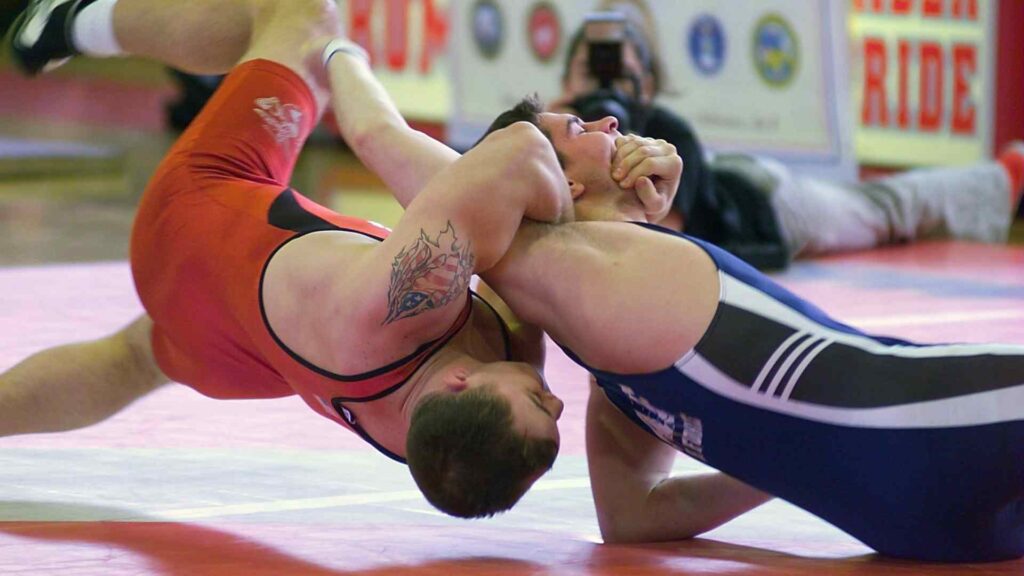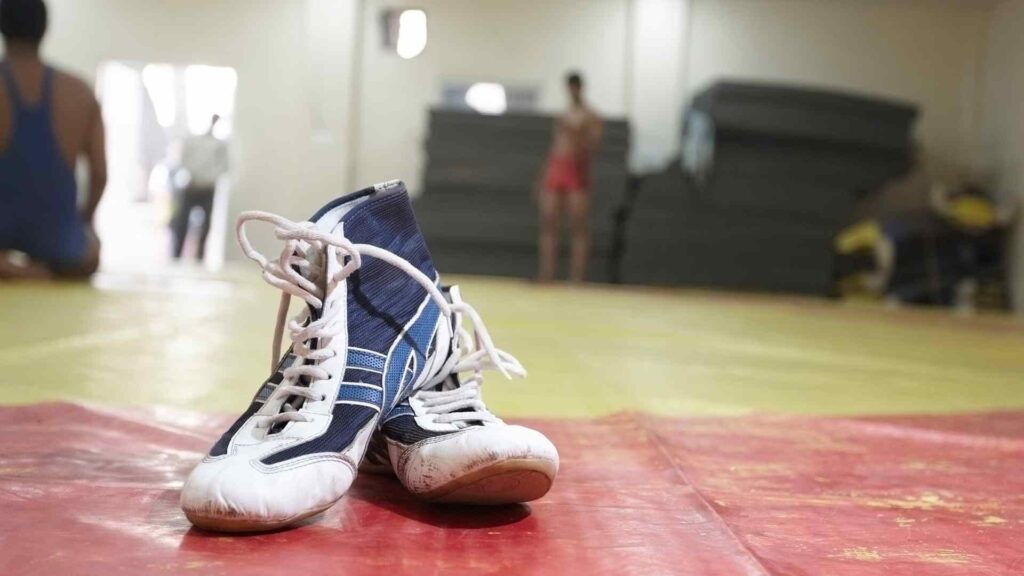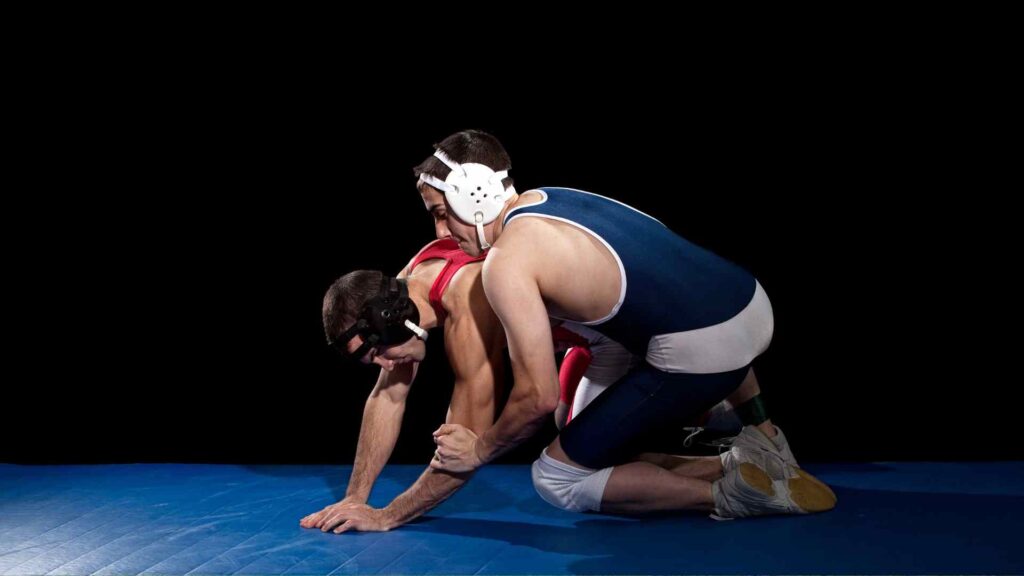Chris Benoit, a legendary professional wrestler, left an indelible mark on the wrestling world. Known for his technical prowess and intense persona, Benoit was a man of many nicknames.
Each nickname he earned tells a story of his career, his character, and his unparalleled dedication to the sport.
The Canadian Crippler
Chris Benoit earned the nickname “The Canadian Crippler” during his early career in Extreme Championship Wrestling (ECW).
This moniker solidified his reputation as one of the most intense and hard-hitting wrestlers in the ring.
The name originated from a now-infamous match where Benoit accidentally injured his opponent, Sabu, with a devastating suplex. Though the injury was unintended, the incident underscored Benoit’s ferocity in the ring.
The nickname captured both admiration and fear among fans and fellow wrestlers alike. It spoke to his aggressive yet technical style, a blend of brute force and precision that made his matches unforgettable.
Despite its controversial origins, “The Canadian Crippler” became synonymous with Benoit’s no-nonsense approach to wrestling.
Beyond its dramatic flair, the nickname also reflected Benoit’s identity as a proud Canadian. His roots in Alberta, Canada, played a crucial role in shaping his career, from training in the Hart Family Dungeon to his rise in international wrestling.
Through this name, Benoit paid homage to his heritage while maintaining his intimidating persona.

The Rabid Wolverine
“The Rabid Wolverine” encapsulated Chris Benoit’s relentless determination and intense focus in the ring. Unlike many larger-than-life wrestling personas, Benoit embraced a gritty, realistic style.
This nickname highlighted his animalistic ferocity, which often saw him throwing himself into matches with unparalleled aggression.
This moniker gained prominence during his time in World Championship Wrestling (WCW) and later in World Wrestling Entertainment (WWE).
The “Wolverine” comparison was apt, given Benoit’s smaller stature relative to some of his opponents. What he lacked in size, he compensated for with unmatched technical skill and an almost predatory instinct to exploit his opponent’s weaknesses.
Benoit’s finishing moves, such as the Crippler Crossface, further reinforced this nickname. The maneuver symbolized his ability to ensnare opponents, much like a wolverine catching its prey. “Rabid” emphasized his unyielding energy, as Benoit often pushed through pain and exhaustion to deliver electrifying performances.

Pegasus Kid
Before Chris Benoit became a household name in North America, he was known as “Pegasus Kid” during his stint in Japan.
Wrestling for New Japan Pro-Wrestling (NJPW), Benoit donned a mask and adopted this nickname to fit the larger-than-life characters typical of Japanese wrestling.
The “Pegasus Kid” persona showcased Benoit’s high-flying abilities, a stark contrast to the grounded, technical style he later became famous for. His matches during this time demonstrated his versatility, as he adapted to the fast-paced, acrobatic style of Japanese wrestling.
The name “Pegasus Kid” symbolized Benoit’s potential and youth, as Pegasus is a mythical creature associated with grace and power.
This era of his career allowed him to refine his skills, learning from some of the best wrestlers in the world. Though he eventually unmasked and moved on from this character, the lessons he learned as Pegasus Kid were instrumental in shaping his future success.
Wild Pegasus
As Benoit transitioned to wrestling under his real name in Japan, he adopted the nickname “Wild Pegasus.” This evolution marked a shift in his persona, reflecting a more mature and formidable version of the Pegasus Kid.
“Wild Pegasus” was an apt description of Benoit’s wrestling style at the time—unpredictable, untamed, and full of raw power. This name became particularly iconic during Benoit’s participation in NJPW’s prestigious Super J-Cup tournaments, where he faced off against some of the greatest junior heavyweights in the world.
Winning the 1994 Super J-Cup solidified “Wild Pegasus” as a legendary figure in Japanese wrestling. His technical precision, combined with a fierce, no-holds-barred attitude, earned him accolades and respect from fans and peers alike. The nickname “Wild Pegasus” symbolized Benoit’s status as a rare and untamable talent in the wrestling world.
The Dynamite Kid Protégé
Throughout his career, Chris Benoit was often referred to as “The Dynamite Kid Protégé.” This nickname highlighted his admiration for and influence by the legendary Dynamite Kid, a fellow Canadian wrestler known for his technical skill and high-impact style.
Benoit modeled much of his in-ring work after the Dynamite Kid, adopting similar moves, pacing, and even a comparable physique. The mentorship, though indirect, shaped Benoit’s wrestling philosophy, emphasizing precision, storytelling, and intensity.
This nickname also underscored the generational connection in wrestling. Benoit carried the torch of Dynamite Kid’s legacy, bringing a similar approach to a new audience while adding his unique flair. The comparison was both a tribute and a testament to Benoit’s dedication to honoring his idol.

Toothless Aggression
During a particularly memorable period in WWE, Chris Benoit sported a chipped tooth, earning him the playful yet fitting nickname “Toothless Aggression.” The moniker was a clever nod to his tenacity in the ring and WWE’s “Ruthless Aggression” era.
Fans embraced the nickname as a humorous yet accurate portrayal of Benoit’s persona. Despite its lighthearted origins, “Toothless Aggression” symbolized his grit and refusal to let anything—minor injuries included—deter him from his mission to dominate.
The nickname also became a fan favorite for its uniqueness. It highlighted Benoit’s humanity while emphasizing his unwavering commitment to his craft.
The Silent Warrior
Unlike many of his contemporaries, Chris Benoit rarely relied on flashy promos or extravagant entrances. This stoic demeanor earned him the nickname “The Silent Warrior.”
The name reflected Benoit’s focus on action over words. In an industry where charisma often overshadowed skill, Benoit let his wrestling speak for itself. His matches were storytelling masterpieces, conveying emotion and drama without the need for excessive dialogue.
“The Silent Warrior” also encapsulated Benoit’s dedication to the wrestling art form. He approached his craft with humility and discipline, earning respect from fans and colleagues alike.
Conclusion
Chris Benoit’s nicknames offer a glimpse into his storied career, reflecting the evolution of his character, his wrestling style, and his impact on the sport. From “The Canadian Crippler” to “The Silent Warrior,” each name tells a story of passion, resilience, and unmatched dedication.
FAQs
- What was Chris Benoit’s most famous nickname?
“The Canadian Crippler” is arguably Benoit’s most iconic nickname, representing his intense wrestling style. - Why was Chris Benoit called ‘The Rabid Wolverine’?
This nickname highlighted Benoit’s aggressive, relentless energy in the ring and his smaller, yet mighty stature. - What is the origin of ‘Pegasus Kid’?
Benoit adopted this name in Japan during his NJPW tenure, performing as a masked wrestler with a high-flying style. - What does ‘Toothless Aggression’ signify?
It’s a humorous yet fitting nickname reflecting Benoit’s fierce determination and his chipped tooth during WWE’s “Ruthless Aggression” era. - Who inspired Chris Benoit’s wrestling style?
Benoit was heavily influenced by the Dynamite Kid, earning the nickname “The Dynamite Kid Protégé.” - Why is Benoit called ‘The Silent Warrior’?
This nickname reflects his reserved demeanor and emphasis on letting his wrestling speak louder than his words.
